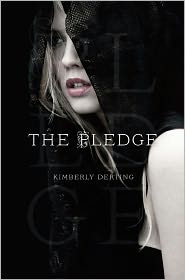
"For some reason I am able to forgive the one dimensional characters and "too fast" of pace because of the end result: a book I couldn't put down." — Miss Remmers
Release Date: November 15th, 2011
Publisher: Simon and Schuster
Challenges: Dystopia Challenge, 100+ Reading Challenge, eBook Challenge
"In the violent country of Ludania, the language you speak determines what class you are, and there are harsh punishments if you forget your place—looking a member of a higher class in the eye can result in immediate execution. Seventeen-year-old Charlaina (Charlie for short) can understand all languages, a dangerous ability she’s been hiding her whole life. Her only place of release is the drug-filled underground club scene, where people go to shake off the oppressive rules of the world they live in. There, she meets a beautiful and mysterious boy who speaks a language she’s never heard, and her secret is almost exposed. Through a series of violent upheavals, it becomes clear that Charlie herself is the key to forcing out the oppressive power structure of her kingdom…."
I began "The Pledge" with knowing nothing more than the synopsis and that it was a "pretty big deal" on Twitter when it was released via the Galley Grab; this was basically a "blind read" for me. Let me start with my initial reaction: complete and pure love. I read almost the entirety of this novel on Sunday when my husband was watching football and after our Sunday night family dinner with the in-laws we went to see "Real Steel" in theaters and I was still thinking about this book. As an exhausted new teacher, there are very few books that I "stay up for" (because, seriously, I'm usually in bed by 9:30) so when I told Dan that I wanted to stay up and read while he watched the days football highlights, he was completely shocked. An hour and a half later I finished "The Pledge" and couldn't wait to tell everyone about it.
I loved the pacing, I loved the plot, I loved the entire concept! I absolutely loved all the parallels to society today and loved analyzing the book in comparison to immigration and language barriers; I found several wonderful quotes that I have written down below to tease you. I mean, the power of words is unmistakable but Derting does such a fantastic job of highlighting and illustrating that power. I loved the twits and I loved how I never really knew which characters to trust. My initial reaction to this book was pure and complete adoration.
But within a days time I was online and reading reviews and one particular review (compliments of April from Good Books and Wine) has kept me thinking. This review brought up tons of different points that I realized I agree with but had just never thought about. I realized, after reading this thorough and fair review, that the characters aren't multidimensional — I can't tell you why I like Max or what makes Charlie so special (besides for being "plain" — which I guess has become synonymous with "the girl next door" that every protagonist lately has become). I don't understand why Max is "intrigued" by Charlie and I don't understand Charlie and Aron's relationship.
April's points about pacing also rang true for me. I couldn't put this book down because I was never bored but that probably has a lot to do with the fact that the entirety of this story really takes place in a very small time frame. Now that I think about it, I'm a bit flabbergasted that the entire plot took place in the span of a few days and that one girl's life could change so completely. But while I was reading, none of this bothered me or even occurred to me.
I think the power of the review is astonishing. April's review of this book has kept me thinking and comparing my thoughts to hers and how we agree on so much but our feelings at the end were so different. Even with all of these points, this book was still amazing for me. For some reason I am able to forgive the one dimensional characters and "too fast" of pace because of the end result: a book I couldn't put down.
Favorite Quotes:
"That was when the class system was first imposed. It was designed to discourage future uprisings, to keep people living apart so ideas of rebellion could not be co-mingled. Language became a tool, a way to complete that division... words had become the ultimate barrier" (144 — according to my Nook in the Galley).
"These Outcasts who spoke only one shared language, seemed happier than those... who were segregated by words and ruled by fear" (225 — again, my Nook in the Galley).
-Visit Lisa around the web here: Website | Blog | Goodreads | Twitter
-BUY THE BOOK: Amazon | Kindle | Barnes and Noble | Nook
To the FTC, with love: eGalley from NetGalley